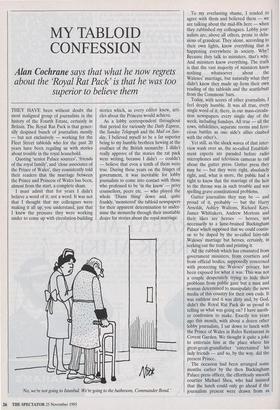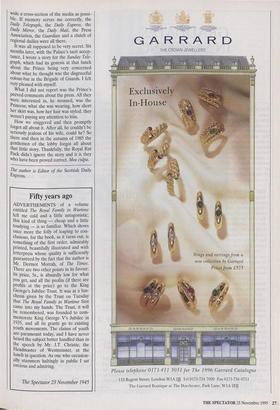MY TABLOID CONFESSION
Alan Cochrane says that what he now regrets
about the 'Royal Rat Pack' is that he was too superior to believe them
THEY HAVE been without doubt the most maligned group of journalists in the history of the Fourth Estate, certainly in Britain. The Royal Rat Pack is that gener- ally despised bunch of journalists mostly — but not exclusively — working for the Fleet Street tabloids who for the past 20 years have been regaling us with stories about trouble in the royal household.
Quoting 'senior Palace sources', 'friends of the royal family', and 'close associates of the Prince of Wales', they consistently told their readers that the marriage between the Prince and Princess of Wales has been, almost from the start, a complete sham.
I must admit that for years I didn't believe a word of it; not a word. It was not that I thought that my colleagues were making it all up, you understand, just that I knew the pressure they were working under to come up with circulation-building stories which, as every editor knew, arti- cles about the Princess would achieve.
As a lobby correspondent throughout that period for variously the Daily Express, the Sunday Telegraph and the Mail on Sun- day, I believed myself to be a far superior being to my humble brethren hewing at the coalface of the British monarchy. I didn't really approve of the stories the rat pack were writing, because I didn't — couldn't — believe that even a tenth of them were true. During these years on the fringes of government, it was inevitable for lobby journalists to come into contact with those who professed to be 'in the know' — privy counsellors, peers etc. — who played the whole 'Diana thing' down and, quite frankly, `monstered' the tabloid newspapers for their apparent determination to under- mine the monarchy through their insatiable desire for stories about the royal marriage.
`No, we're not going to Istanbul We're going to the bathroom, Commander Bond.' To my everlasting shame, I tended to agree with them and believed them — we are talking about the mid-80s here — when they rubbished my colleagues. Lobby jour- nalists are, above all others, prone to delu- sions of grandeur. They alone, according to their own lights, know everything that is happening everywhere in society. Why? Because they talk to ministers, that's why. And ministers know everything. The truth is that the vast majority of ministers knew nothing whatsoever about the Waleses' marriage, but naturally what they didn't know they made up from their own reading of the tabloids and the scuttlebutt from the Commons' bars.
Today, with scores of other journalists, I feel deeply humble. It was all true, every single word of it; there, in our mass-circula- tion newspapers every single day of the week, including Sundays. All true — all the rows, infidelities, separate rooms and fero- cious battles as one side's allies clashed with the other's.
Yet still, as the shock waves of that inter- view wash over us, the so-called Establish- ment experts are paraded before radio microphones and television cameras to rail about the gutter press. Gutter press they may be — but they were right, absolutely right, and, what is more, the public had a right to know that the marriage of the heir to the throne was in such trouble and was spelling grave constitutional problems.
Gutter journalists they may be — and proud of it, probably — but the Harry Arnolds, Ashley Waltons, Richard Kays, James Whittakers, Andrew Mortons and their likes are heroes — heroes, not necessarily to a lame-brained Buckingham Palace which supposed that we could contin- ue to be duped by the so-called fairy-tale Waleses' marriage but heroes, certainly, in seeking out the truth and printing it.
All the rubbish which has emanated from government ministers, from courtiers and from official bodies, supposedly concerned with protecting the Waleses' privacy, has been exposed for what it was. This was not a couple desperately trying to hide their problems from public gaze but a man and woman determined to manipulate the news media of this country for their own ends. It was ruthless and it was dirty and, by God, didn't the Royal Rat Pack do us proud in telling us what was going on? I have anoth- er confession to make. Exactly ten years ago this month, with about a dozen other lobby journalists, I sat down to lunch with the Prince of Wales in Rules Restaurant in Covent Garden. We thought it quite a joke to entertain him at the place where his great-great-grandfather 'entertained' his lady friends — and so, by the way, did the present Prince.
The occasion had been arranged some months earlier by the then Buckingham Palace press officer, the effortlessly smooth courtier Michael Shea, who had insisted that the lunch could only go ahead if the journalists present were drawn from as wide a cross-section of the media as possi- ble. If memory serves me correctly, the Daily Telegraph, the Daily Express, the Daily Mirror, the Daily Mail, the Press Association, the Guardian and a clutch of regional dailies were all there.
It was all supposed to be very secret. Six months later, with the Palace's tacit accep- tance, I wrote a story for the Sunday Tele- graph, which had its genesis at that lunch about the Prince being very concerned about what he thought was the disgraceful colour-bar in the Brigade of Guards. I felt very pleased with myself. What I did not report was the Prince's Peeved comments about the press. All they were interested in, he moaned, was the Princess; what she was wearing, how short her skirt was, how her hair was styled; they weren't paying any attention to him. How we sniggered and then promptly forgot all about it. After all, he couldn't be seriously jealous of his wife, could he? So there and then in the autumn of 1985 the gentlemen of the lobby forgot all about that little story. Thankfully, the Royal Rat Pack didn't ignore the story and it is they who have been proved correct. Mea culpa.
The author is Editor of the Scottish Daily Express.



















































































 Previous page
Previous page